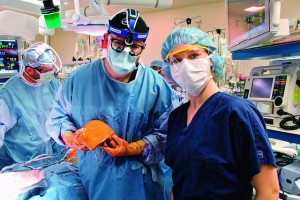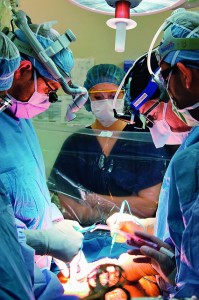Student externs go inside the operating room with Dr. Kenneth Chavin ’83.
By Kevin Gray
“As a parent, the transplants that involve children really hit my heart.”

Dr. Kenneth Chavin ’83 P’16 describes the transplant procedure and liver characteristics with Emily Oliver ’17 in the Medical University of South Carolina operating room.
Dr. Kenneth Chavin ’83 P’16 was reflecting as he prepared to fly from his base at Medical University of South Carolina (MUSC) in Charleston to another hospital in South Carolina. His mission was to divide a donated liver into two pieces and transplant a segment of it into a baby that evening.
“It’s a privilege and an honor that patients and their families who are facing life-and-death situations trust me and our team to get them through this very difficult time and give them a new lease on life with an organ transplant,” he says.
Chavin, who has participated in more than 800 liver transplants and 1,000 kidney transplants, is moved as he talks about sharing a video with a young colleague recently. Created 16 years ago, it details the first organ transplant from a living donor performed at MUSC. A young girl receives a transplant from her father, who donated the left lobe of his liver. Suffering from the acute onset of liver failure, the girl would have died within 48 hours of the filming, Chavin says, had she not received the transplant.
“After the surgery, she was in a coma and woke up about 48 or 72 hours later,” Chavin says. “Her father was already recovering and able to be at her bedside when she woke up. She is now a senior in high school, ready to graduate and go to college. She runs for her school’s championship cross-country team, and her father still runs with her. To see the life she’s lived is extremely gratifying.”
It’s not surprising that Chavin relishes sharing this powerful testament to the impact transplant surgeons can have on lives. He embraces the role of mentor. For the past six years, he has hosted Lafayette interns and externs at MUSC.

Emily Oliver ’17 observes a liver transplant at the Medical University of South Carolina operating room.
This past winter break he hosted biochemistry major Emily Oliver ’17 (Westminster, Colo.) and engineering studies major Stephanie Roman ’17 (Sandy Hook, Conn.).
“I went on an externship to shadow a surgeon who does liver and kidney research. That week changed my life,” says Oliver. “I’ve always wanted to be a doctor and this experience has shed a brand new light on the sort of life I can live as a doctor.”
The students explored life in the clinic, viewed multiple surgeries in the operating room, learned about Chavin’s research program, followed his third-year medical students on rounds, and used the students’ simulation lab to practice laparoscopy.
“Besides learning about the biology of kidneys, livers, and the associated systems necessary to understand for diagnosis and treatment, I learned about what life is like as a doctor, surgeon, and researcher, as well as how to make difficult decisions for the patient,” says Oliver.
Photos by Riviere Propst, Medical University of South Carolina Department of Surgery

